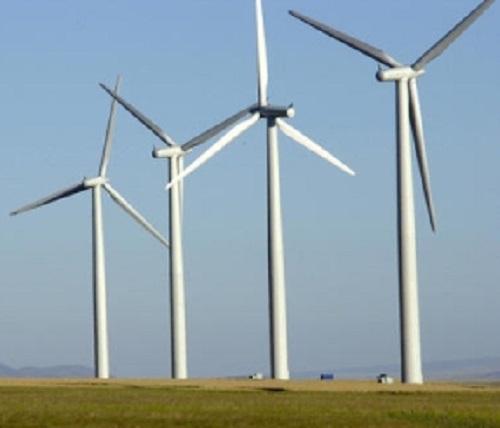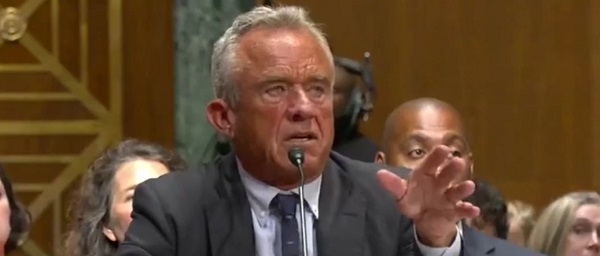Daily Caller
Trump Is Most Consequential Energy President In US History


From the Daily Caller News Foundation
Just eight months into his second presidency, a strong case can be made that President Donald Trump must now be considered the most consequential energy president in U.S. history. A convergence of major recent international events helps prove the case.
New Lloyd’s of London CEO Patrick Tiernan moved this week to scrap the net-zero policies invoked by his predecessor, an obvious concession to the sea change in energy and climate policy direction underway in the second presidency of Trump.
Lloyd’s previous CEO, John Neal, put in place policies requiring that participants in the Lloyd’s insurance market quit insuring energy projects that don’t conform to the net-zero goals laid out by the 2016 Paris Climate Accords by the year 2030. Neal further pledged to transform the entire Lloyd’s insurance market into a pure net-zero business model by 2050.
Dear Readers:
As a nonprofit, we are dependent on the generosity of our readers.
Please consider making a small donation of any amount here.
Thank you!
“It is important that Lloyd’s remains apolitical,” Tiernan said of the company’s change in direction. “The 2050 targets are government targets. We operate in multiple jurisdictions under different governments with different targets. We have to operate under the policies and the laws of where we operate.”
Obviously, the policies and laws in the United States, the market in which so many Lloyd’s insurers maintain major interests, have undergone a seismic shift since Mr. Trump took office in January, a shift that seems destined to continue for at least the next 40 months, and possibly for years longer. Trump’s policy turnabout has had major impacts on the U.S. energy picture starting almost from his first day in office, and now the impacts are being felt internationally.
This move by Lloyd’s is far from the only recent signal that major changes are underway. Another bit of proof came from British major oil company Shell, which announced on Wednesday it will abandon its planned biofuels project in Rotterdam after a commercial and technical evaluation deemed it no longer competitive in a rapidly shifting marketplace. The facility was already under construction and would have become the largest biofuels plant on earth if completed.
Shell and its fellow UK-based major, BP, have both responded to the shifting direction of the net-zero globalist ambition by dramatically scaling back their renewables investments and reallocating capital back to their core oil and gas businesses in an effort to become more competitive with U.S. majors ExxonMobil and Chevron. It’s a race in which BP especially has fallen far behind and is now struggling to regain lost ground.
The Trump revolution has also had a big impact on wind developers that are majority owned by other governments, like Denmark’s Orsted and Norway’s Equinor. Equinor was forced in July to take a write down of almost $1 billion related to its U.S. offshore wind ventures in the face of the Trump administration’s multi-pronged assault on that sector, one of former President Joe Biden’s biggest energy-related ambitions.
Orsted, meanwhile, having failed to attract investors to assume big pieces of its own U.S. offshore projects, is now pursuing a $9.4 billion rights issue that constitutes roughly 70% of the company’s full current market value. Orsted’s U.S. struggles also complicate Equinor’s business planning since the Norwegian company owns 10% of its Danish competitor. Fortunately for Orsted, Equinor recently pledged to plow another $1 billion into the rights issue to maintain its ownership percentage; otherwise, Equinor would have seen its position significantly diluted.
Trump’s policy turnabout is also having major impacts on the international banking sector. In late August, the UN-backed Net Zero Banking Alliance announced it was pausing operations amid a flood of high profile members rushing to abandon the cause, leading to speculation that it will soon collapse entirely.
It wasn’t hard to see all these dramatic changes and many others coming once it became obvious the United States was changing its policy direction. America’s out-sized economy and consumer market have always given it out-sized influence on global events. That influence only becomes magnified when the Oval Office is held by a President with Donald Trump’s keen understanding of the power of leverage and the willingness to deploy it.
It all adds up to make President Trump without any question at all the most consequential energy policy president in U.S. history, both at home and abroad.
David Blackmon is an energy writer and consultant based in Texas. He spent 40 years in the oil and gas business, where he specialized in public policy and communications.
Agriculture
In the USA, Food Trumps Green Energy, Wind And Solar


From the Daily Caller News Foundation
By Bonner Cohen
“We will not approve wind or farmer destroying Solar,” said President Trump in an Aug. 20 post on Truth Social. “The days of stupidity are over in the USA!!!”
Trump’s remarks came six weeks after enactment of his One Big Beautiful Bill terminated tax credits for wind and solar projects by the end of 2027.
The Trump administration has also issued a stop-work order for the Revolution Wind project, an industrial-scale offshore wind project 12 miles off the Rhode Island coast that was 80 percent completed. This was followed by an Aug. 29 announcement by the Department of Transportation that it was cutting around $679 million in federal funding for 12 offshore wind farms in 11 states, calling the projects “wasteful.”
Sending an unmistakable message to investors to avoid risking their capital on no-longer-fashionable green energy, the Department of Agriculture (USDA) is pulling the plug on a slew of funding programs for wind and solar power.
“Our prime farmland should not be wasted and replaced with green new deal subsidized solar panels,” said Agriculture Secretary Brooke Rollins on a visit to Tennessee in late August. “We are no longer allowing businesses to use your taxpayer dollars to fund solar projects on prime American farmland, and we will no longer allow solar panels manufactured by foreign adversaries to be used in our USDA-funded projects.”
The White House is putting the squeeze on an industry that can ill-afford to lose the privileges it has enjoyed for so many years. Acknowledging the hesitancy of investors to fund green-energy projects with the looming phaseout of federal subsidies, James Holmes, CEO of Solx, a solar module manufacturer, told The Washington Post, “We’re seeing some paralysis in decision-making in the developer world right now.” He added, “There’s been a pretty significant hit to our industry, but we’ll get through it.”
That may not be easy. According to SolarInsure, a firm that tracks the commercial performance of the domestic solar industry, over 100 solar companies declared bankruptcy or shut down in 2024—a year before the second Trump administration started turning the screws on the industry.
As wind and solar companies confront an increasingly unfavorable commercial and political climate, green energy is also taking a hit from its global financial support network.
The United Nations-backed Net Zero Banking Alliance (NZBA) “has suspended activities, following the departure of numerous financial institutions from its ranks amid political pressure from the Trump administration,” The Wall Street Journal reported. Established in 2021, the NZBA’s 120 banks in 40 countries were a formidable element in global decarbonization schemes, which included support for wind and solar power. Among the U.S. banks that headed for the exits in the aftermath of Trump’s election were JP Morgan, Citi, and Morgan Stanley. They have been joined more recently by European heavyweights HSBC, Barclays, and UBS.
Wind and solar power require a lot of upfront capital, and investors may be having second thoughts about placing their bets on what looks like a losing horse.
“Wind and solar energy are dilute, intermittent, fragile, surface-intensive, transmission-extensive, and government-dependent,” notes Robert Bradley, founder and CEO of the Institute for Energy Research.
Given these inherent disadvantages of wind and solar power, it’s no surprise that the Department of Agriculture is throttling the flow of taxpayer money to solar projects. The USDA’s mission is to “provide leadership on food, agriculture, food, natural resources, rural development, nutrition, and related issues….” It is not to help prop up an industry whose best days are behind it.
Effective immediately, wind and solar projects will no longer be eligible for USDA Rural Development Business and Industry (B&I) Guaranteed Loan Program. A second USDA energy-related guaranteed loan program, known by the acronym REAP, will henceforth require that wind and solar installations on farms and ranches be “right-sized for their facilities.”
If project applications include ground-mounted solar photovoltaic systems larger than 50 kilowatts or such systems that “cannot document historical energy usage,” they will not be eligible for REAP.
Ending Misallocation Of Resources
“For too long, Washington bureaucrats and foreign adversaries have tried to dictate how we use our land and our resources,” said Republican Rep. Harriot Hagermann of Wyoming. “Taxpayers should never be forced to bankroll green new deal scams that destroy our farmland and undermine our food security.”
Hagermann’s citing of “foreign adversaries” is a clear reference to China, which is by far the world’s leading manufacturer of solar panels, according to the International Energy Agency.
According to a USDA study from 2024, 424,000 acres of rural land were home to wind turbines and solar arrays in 2020. While this – outdated – figure represents less than 0.05 percent of the nearly 900 million acres of farmland in the U.S., the prospect of ever-increasing amounts of farmland being taken out of full-time food production to support part-time energy was enough to persuade USDA that a change of course was in order.
Bonner Russell Cohen, Ph. D., is a senior policy analyst with the Committee for a Constructive Tomorrow (CFACT).
COVID-19
RFK Jr. Calls Out CDC’s ‘Disastrous’ Failures, Defends Cleaning House In Heated Hearing


From the Daily Caller News Foundation
By Emily Kopp
Health and Human Services Secretary Robert F. Kennedy Jr. challenged the record of the Centers for Disease Control and Prevention (CDC) on the COVID-19 pandemic and the precipitous rise in chronic disease in the U.S. as he defended his shakeup of the health agency at a Senate hearing Thursday.
“These changes were absolutely necessary to restore the CDC’s role as the world’s gold standard public health with a central mission of protecting Americans from infectious disease,” Kennedy said. “CDC failed that responsibility miserably during COVID when its disastrous and nonsensical policies destroyed small businesses, violated civil liberties, closed our schools and caused generational damage in doing so, masked infants with no science and heightened economic inequality.”
The combative hearing follows Kennedy’s high-profile showdown with former CDC Director Susan Monarez last week. Kennedy ousted Monarez from the post on Aug. 25, less than a month into her tenure, over a dispute about his overhaul of the committee that advises the CDC on vaccine schedules.
Dear Readers:
As a nonprofit, we are dependent on the generosity of our readers.
Please consider making a small donation of any amount here.
Thank you!
In a Senate Finance Committee hearing, Democrats and Republican Sen. Bill Cassidy of Louisiana criticized Kennedy for his actions to remake the Advisory Committee on Immunization Practices (ACIP), as well as changes by the Food and Drug Administration (FDA) to COVID-19 vaccine approvals. They lambasted Kennedy as undermining confidence in vaccines and in established science.
“I’m approaching this as a doctor, not as a senator. I am concerned about children’s health, seniors’ health, all of our health. And I applaud you for joining the president in a call for radical transparency,” said Cassidy, referring to President Donald Trump’s call on Truth Social for COVID vaccine manufacturers to make data more readily available.
Cassidy last week appeared to side with Monarez in her dustup with Kennedy, urging physicians to ignore the ACIP’s recommendations.
Monarez alleged in a Wall Street Journal op-ed published hours before the hearing that Kennedy had pressured her to preapprove the outcome of an ACIP meeting scheduled for Sept. 18-19. Kennedy said that the op-ed amounted to a lie. He denied having a private meeting with her in which he asked her to leave.
Kennedy dismissed criticism of the changes to the ACIP from the American Academy of Pediatrics, pointing to the association’s pharmaceutical ties. Kennedy also cited a 2000 congressional investigation into physicians and scientists serving on the committee with financial stakes in the drugmakers they oversaw.
“I didn’t politicize ACIP, I depoliticized it,” Kennedy said.
Kennedy answered the broader criticism with a scathing referendum of the CDC’s actions during the COVID pandemic and insisted the agency should focus on its original mission of protecting Americans from infectious diseases. Kennedy added the agency requires “new blood” in light of the CDC’s “catastrophically bad judgement” during the pandemic.
“The U.S. is home to 4.2% of the world’s population yet we had nearly 20% of the COVID deaths,” Kennedy said. “The people at CDC who oversaw that process, who put masks on our children, who closed our schools, are the people who will be leaving.”
Kennedy also questioned whether the CDC was complacent amid a precipitous rise in rates of obesity, heart disease and diabetes.
“CDC’s job was to make sure this didn’t happen,” he said.
Sometimes Kennedy also directly challenged the records of individual senators on the panel, including Sens. Michael Bennet of Colorado, Elizabeth Warren of Massachusetts and Ron Wyden of Oregon.
Kennedy accused Wyden of overseeing a rise in childhood chronic disease from a position of influence over American health care.
“Senator you’ve sat in that chair for how long? Twenty, twenty-five years? While the chronic diseases in our children went up to 76%. And you said nothing,” Kennedy said.
Wyden has served on the Finance Committee, which shares jurisdiction over health policy issues, since 1996.
Kennedy also named a litany of HHS priorities addressed since his February confirmation, asserting that his brief tenure has been among the most productive in history on issues ranging from food dyes, baby formula, fluoride in tap water, 7-OH or “gas station heroin,” drug prices, the “GRAS” loophole, reducing animal testing, ending gain-of-function research, FDA drug approvals and ending diversity, equity and inclusion (DEI) policies.
Kennedy also opened his testimony by expressing sympathy for the family of Dekalb County police officer David Rose who died by gunshot in an attack on CDC headquarters.
Pullback Of COVID Vaccines In Perpetuity
Several senators criticized a new FDA framework to require new clinical trial data for annual COVID-19 booster shots for healthy adults and children. Democrats portrayed the move as a betrayal of Kennedy’s promise at confirmation hearings earlier this year to not restrict access to vaccines. People can continue to seek the vaccine off-label, but the HHS actions limit insurance coverage.
Kennedy reminded the panel that two top vaccine regulators at the FDA during the Biden administration, Marion Gruber and Phil Krause, departed the agency in response to pressure to approve a boosters-for-all strategy without this clinical evidence in 2021.
The hearing also occasionally delved into other more contentious topics where Kennedy diverges from many Republicans on Capitol Hill.
Sen. Chuck Grassley sought reassurance from Kennedy, a frequent critic of genetically modified crops, synthetic pesticides and their manufacturers, that he would let the U.S. Department of Agriculture lead regulation of agriculture. Kennedy agreed and added that he was working with USDA Secretary Brooke Rollins on certain priorities.
Kennedy also alleged the CDC buried evidence of an association between the Mumps, Measles and Rubella (MMR) vaccine and autism in children, which could land him in hot water with a broader coalition of lawmakers.
-

 Crime24 hours ago
Crime24 hours agoTrump confronts mainstream media with Chicago’s bloody receipts
-

 Alberta13 hours ago
Alberta13 hours agoPremier Smiths “must-see” video describing destructive federal energy policies and pointing to solutions
-

 Agriculture7 hours ago
Agriculture7 hours agoIn the USA, Food Trumps Green Energy, Wind And Solar
-

 Business1 day ago
Business1 day agoCarney engaging in Orwellian doublethink with federal budget rhetoric
-

 Business11 hours ago
Business11 hours agoManitoba Must Act Now To Develop Its Northern Ports
-

 Bruce Dowbiggin16 hours ago
Bruce Dowbiggin16 hours agoKen Dryden: Hockey’s Diogenes. He Called Them As He Saw Them
-

 Business14 hours ago
Business14 hours agoCourt’s ‘Aboriginal title’ ruling further damages B.C.’s investment climate
-

 Censorship Industrial Complex14 hours ago
Censorship Industrial Complex14 hours agoFreedom of speech under threat on university campuses in Canada






